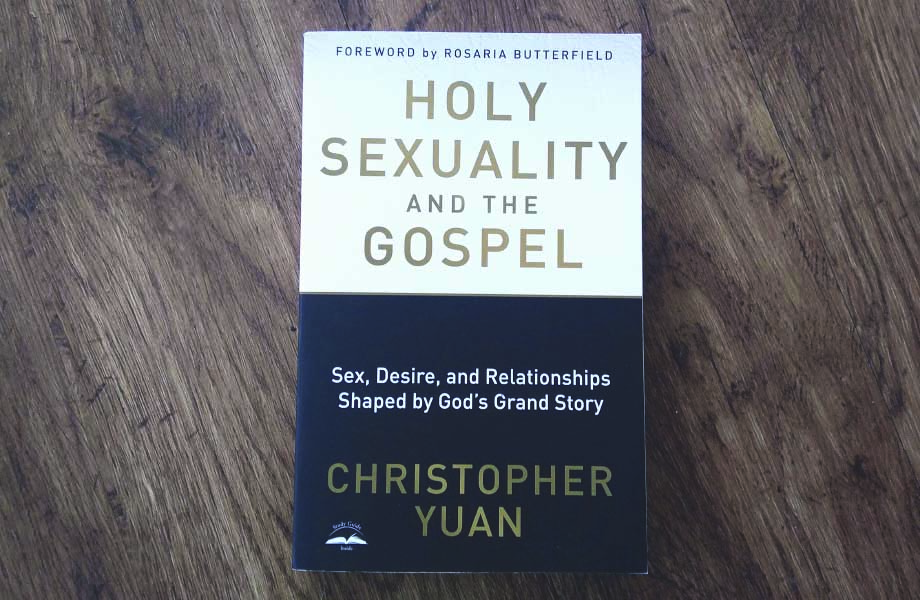Review: "Holy Sexuality and the Gospel" by Christopher Yuan
This book’s awkward title gives little hint of the interesting and uplifting material within the pages. The reason for coining the phrase “Holy Sexuality” is to move away from terms such as homosexual and heterosexual, in order to make the point that every Christian is called to self-denial and holiness in this area, while the word “Gospel” points to the concept that we all have fallen natures to deal with, and suffer from the effect of original sin. No-one should feel that the gospel hasn’t “worked” for them, or that they are in any way less sanctified because they still deal with sexual temptations.
Rooted in his own story
This is Christopher Yuan’s second book. His first book (“Out of a Far Country”) was a memoir of his own personal journey, whereas here he helps his readers to deal with the challenge of their own sexuality, as well as issues such as anxiety about long-term singleness. In fact, a major topic of the book is marriage and singleness, which he repeatedly returns to look at from different angles, making the book very relevant to anyone who is single but who would like to be married.
However, snippets of his own, very personal, story are retold: He attended the US Marines boot camp, and then dental school, came out to his parents as gay, was rejected by his non-Christian mother, and was eventually found to be HIV positive while in prison for drug dealing. By that time, his mother and father had both come to faith. After their conversion, they switched to pouring out love and acceptance on their lost son, in contrast to the expectation that Christians are judgmental. When a gay friend of his was alone in hospital, the only ones who came were his parents: “their compassion took me by surprise.” At a low point in jail, before being sentenced, he saw scribbled on the metal bunk above him, “If you’re bored, read Jeremiah 29:11.” He is now a professor at Moody Bible Institute, where he is approached every semester by students who confide that they struggle with same-sex attraction.
Challenging received wisdom
The early part of the book was much less interesting for me than the rest, as he lays his groundwork a little too thoroughly. He explores concepts which are already accepted, such as mankind being in the image of God, and original sin. It is only after these roughly 30 pages that the reader starts to be surprised by some unusual takes on some familiar Bible passages - insights that are convincingly argued with evidence from the Bible itself. To be fair, he does later draw on the book’s early foundations. For example, he takes the idea of original sin to reassure parents who might be weighed down by ideas, blindly accepted by Christians, that the primary root of homosexuality is an absentee father or dominant mother. He also points out, “my older brother and I had very similar upbringings, yet he never struggled with same-sex attractions.” For those who ask questions such as “If I still struggle against same-sex sexual desires, am I a gay Christian?” he challenges the view that sexual desires reveal who we are at our deepest core or define our identity.
The book examines claims made both by prominent theologians such as James Brownson, and by gay activists such as Matthew Vines, that sexual differentiation is not essential to marriage. He takes the assertions they make about certain Bible passages and searches out what those passages actually say. Some of the issues he examines take him beyond what can be found in the Bible. For example, he looks at the evidence for the claim, asserted by author Jen Hatmaker, that traditional values in society can be blamed for the higher rate of suicide among youth identifying as gay.
Practical advice
Later in the book, he adds helpful, practical action points for those trying to share Christ with gay loved ones. He writes, “Some of you may be thinking of a particularly close friend right now – someone you believe may have same-sex attractions. Can you bring it up? How should you ask? Don’t!”. There is plenty of pastoral advice for those who ask questions such as, “How do I love my adult children who identify as gay, and are giving me ultimatums about an upcoming wedding?” or, “As you listen to your gay friends’ stories about their partners, how might you respond?” He writes, “Parents, you must realize that your children don’t doubt your position on homosexuality; they are uncertain whether you fully love them... having a child’s partner in the home does not communicate approval.” Another piece of advice is this: “Be a friend, not an expert ... You can simply acknowledge your friend’s experience, saying “I see that this person means a lot to you.” And again, “Don’t use the words lifestyle or choice. When I lived as a gay man, it was not my choice, it was simply who I was.”
The tone of the book is warm and encouraging. It should help those who feel singleness is hard, those who feel somehow less successful as Christians because of their same-sex attraction, and those who wonder how to love gay friends or family members.
Holy Sexuality and the Gospel by Christopher Yuan
(Multnomah, 2018) 251 pages
£10.99 paperback, £9.99 Ebook
This article was originally published in the Winter 2020 edition of the TFT magazine, Ascend. Click the button below to download your copy.
Download the Winter 2020 edition of Ascend






